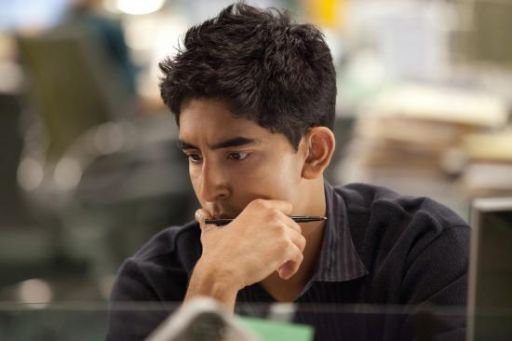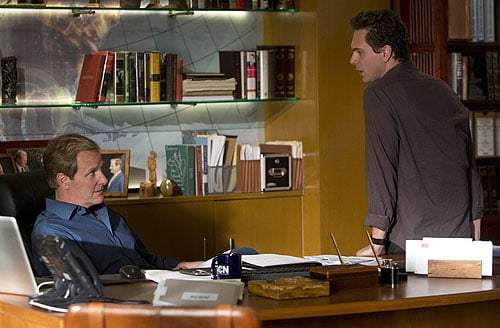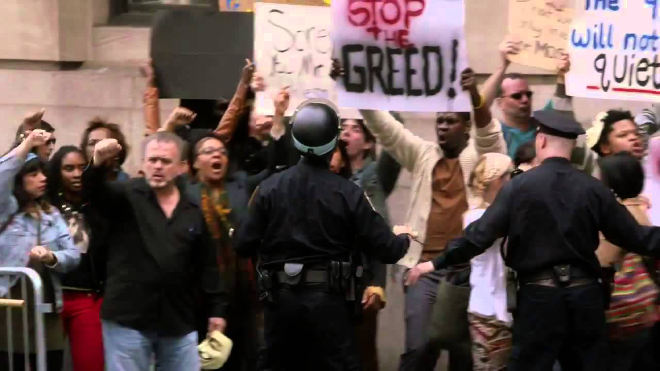The Newsroom 2.2: Is Cable News Right(eous) Enough?
Getting everything right makes for excellent news reporting, but poor fiction. A little wrong goes a long way.

Here you’ll find a recap of this week’s episode of The Newsroom — and all the spoilers that implies.
–
Aaron Sorkin’s favourite type of American hero is a smart man (or, occasionally, woman) who knows that what is right and what is the right thing to do are often in conflict with one another; that you can know the former, while doing the latter. How many times did Jed Bartlet look over his glasses at a staffer railing against some injustice, signalling to them that he was with them, but principle had to cede ground to pragmatism? In a later season of The West Wing, one character leaks highly classified information in the interests of spurring the US to take life-saving action; that character loses their job, their freedom, and the respect of the President; they felt they were on the side of right, but they did the wrong thing.
The Newsroom is, in part, an attempt to address a perceived problem with cable news: that it’s not right, or righteous, enough. The interminable first season credits, which evoked Murrow and the golden age of TV news, made that explicit. It’s an attempt at the kind of wish-fulfilment that The West Wing grew into, almost by necessity. But just like every storybook character who gets everything they want and still isn’t happy, The Newsroom discovered that perfection is awfully dull. Getting everything right makes for excellent news reporting, but poor fiction — so it’s interesting to see which stories the show decides to get wrong.
Of course, drone strikes and #Occupy did actually turn out to be two of the biggest stories of the last three years, so Mac’s initial scorn of both was always going to be a token nod to the fact that nobody’s right all the time.
And the staffers at the pitch meeting were right to laugh at the Anonymous video — it’s doomy and takes itself way too seriously, and they had no idea yet that it was actually going to be part of something important.
The show has copped a lot of flack for its 20/20 hindsight, from this writer included — but in stories about journalism, there is a grand tradition of hunches; of “naturals” with a “nose for a story”. Neal (and Dev Patel himself, who’s terrific) was given a raw deal with the Bigfoot malarkey last season, but he’s one of the few News Night staffers who actually goes out and gets stories, instead of just happening to know someone who knows something. (Even the all-destroying Genoa story was fed to JD, who then spent his days trying to get hold of a guy who was willing to share information that could put him in Gitmo, on an unsecured line. Even pre-PRISM, that’s kinda dumb.)

Neal got his job with a little cheeky phone-camera journalism during the London bombings; he’s the one who reached out to Amen, the stringer in Egypt who covered the Cairo unrest when Elliott was attacked; and, as a frequenter of popular Internet website Reddit, he was on top of the #Occupy movement before any of his colleagues knew it was A Thing. He has a talent for getting in the thick of it, and that’s a different proposition altogether to an office full of people with all the answers.
Of course, the show can’t control the news that happened after November 2012 — but it sure was interesting to watch Don and Will debate the legal and moral ramifications of a case involving racial tension and a devastating apparent miscarriage of justice after the last couple of weeks. The Troy Davis case and the Trayvon/Zimmerman trial have few parallels, apart from the way they illustrate the particular ways the American legal system fails black men.
But Don argues for the spirit of the law and Will for the letter of the law; Don (who’s been totes into the Davis case from the beginning, just BTW, apparently) knows deep down that Will can’t go on air and advocate for a convicted cop killer, particularly given how well an editorialising McAvoy served ACN last time. But Don argues anyway, and the show is right to use its soapbox to put the Davis case back on people’s minds.

The September 11 coverage scene is odd — it’s too neat having 2001 Charlie come in and comfort 2001 Will with exposition about Will’s own childhood trauma, right before Will goes back on air with a heartfelt bit that’s part Jon Stewart and part Peter Jennings. But at several points in this episode Will is struggling to reconcile his code as a journalist and as a political animal with what he knows is right, and the scene shows him bringing all those instincts together to provide some small comfort to his audience, despite the evils in the world. (Click here to read about how ABC anchor Jennings had a near-identical day on 9/11, in the process creating one of those classic, important newsman moments that this show so desperately wants to portray.)
In a busy, messy episode, the clearest theme was that all its characters are looking for that place where two kinds of right can work together.
–
Caitlin Welsh is a freelance writer. She has written for The BRAG, Mess + Noise, FasterLouder, Cosmopolitan, TheVine, Beat, dB, X-Press, and Moshcam.
You can follow The Newsroom with her here.
